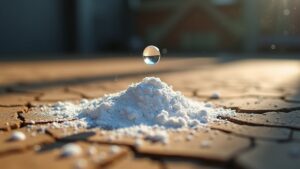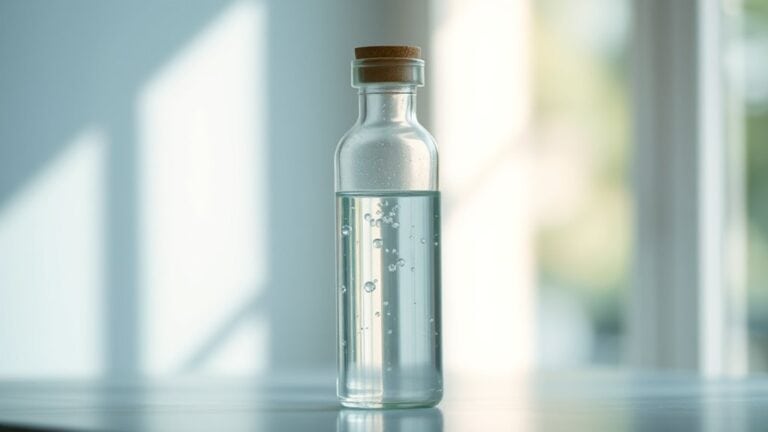Should you skip water while taking creatine, your body pays the price. Since creatine pulls water into your muscles, not drinking enough leaves you dehydrated, making workouts harder and recovery slower. You could feel dizzy, tired, or even get cramps because your muscles aren’t getting the hydration they need. Your kidneys also work harder to process creatine without enough fluids, which can backfire on performance. The fix? Drink up—your gains depend on it.
Dehydration Risks When Combining Creatine and Low Water Intake
Whenever you take creatine without drinking enough water, your body can’t use it properly, and dehydration becomes a real risk. Creatine pulls water into your muscles, which means in case you’re not drinking enough, you may notice dehydration symptoms like dizziness, dry mouth, or headaches.
Your kidneys also work harder to process creatine, so skimping on water intake strains them. Even mild dehydration can zap your energy, making workouts feel tougher than they should.
To avoid this, sip water consistently—don’t wait until you’re thirsty. Aim for at least half your body weight in ounces daily, plus extra in the event that you’re active. Keep a bottle nearby as a reminder.
Should you feel off, check your hydration first—it’s often the simplest fix. Small habits make a big difference.
How Creatine Affects Your Body’s Water Balance
Since creatine draws water into your muscle cells, it shifts your body’s fluid balance, which can leave you feeling parched in the event you don’t adjust your intake.
Your muscles soak up extra water to store creatine, pulling it away from other areas. This process, called creatine metabolism, temporarily changes how your body handles water regulation.
You may notice you’re thirstier than usual, especially during workouts or in hot weather. To stay balanced, drink more fluids—your body’s signaling it needs them.
Ignoring this can lead to mild dehydration, even though you’re not sweating heavily. Pay attention to how you feel; dry mouth or fatigue are hints to hydrate.
The shift isn’t dangerous, but it’s your cue to adapt. Keep a water bottle handy and sip consistently. Your muscles will thank you.
Muscle Cramps and Strain Without Proper Hydration
Should you not be drinking enough water while taking creatine, your muscles might protest with cramps or strain. Creatine pulls water into your muscle cells, which boosts performance but also ups your hydration needs.
Without enough fluids, those muscles tighten up, leading to sharp cramps or even lingering soreness. The risk of muscle discomfort skyrockets, especially during workouts at the time your body’s already pushing hard.
Dehydration makes tissues less flexible, raising injury likelihood—like pulling a muscle mid-lift or feeling that nasty twinge in your calf. Sip water consistently, not just whenever thirsty, to keep cramps at bay.
Aim for at least half your body weight (in ounces) daily, plus extra should you be sweating. Electrolyte-rich drinks help too, but plain water is your best shield against strain.
Listen to your body—it’ll tell you at the moment it’s parched.
Kidney Function and Creatine Processing
Your kidneys work hard to filter creatine, and should you not drink enough water, they can get overworked.
Hydration helps your kidneys flush out the extra creatine without straining them. Without enough fluids, the filtration process slows down, making it tougher on your system.
Creatine and Kidney Strain
Taking creatine without enough water can make your kidneys work harder, but here’s the reassuring part—studies show it’s usually safe for healthy kidneys. Your kidneys filter waste, and creatine effects can increase their workload slightly, but they’re built to handle it.
Should you be well-hydrated, your kidneys process creatine efficiently, so dehydration is the real concern. For kidney health, stick to the recommended dose (3–5 grams daily) and drink plenty of water.
Should you have pre-existing kidney issues, check with a doctor initially. Most people experience no problems, but listen to your body—should you feel off, adjust your intake.
Staying hydrated helps your kidneys do their job without unnecessary strain. Keep it simple: water supports your system, and creatine works best at the outset.
Hydration Impacts Filtration
Water plays a significant role in how well your kidneys filter and process creatine.
Without enough hydration, your kidneys work harder to remove waste, including excess creatine. Staying hydrated aids in diluting creatine in your bloodstream, making filtration smoother. Should you skip water, your kidneys could struggle, leading to potential strain over time.
Smart hydration strategies include drinking water consistently, not just around workouts. Tap water, herbal teas, or electrolyte-rich fluids are excellent water sources to keep you balanced. Aim for clear or light-yellow urine as a simple check.
Pairing creatine with sufficient fluids supports kidney function and prevents dehydration. Listen to your body—thirst is a late signal, so sip regularly. Your kidneys will appreciate the extra care.
Reduced Performance Gains From Inadequate Hydration
Should you not drink enough water with creatine, you may notice muscle cramping more often because your body struggles to stay hydrated.
Without proper fluids, your muscles can’t absorb nutrients as efficiently, slowing down your progress.
Skipping water doesn’t just make you feel sluggish—it actually holds back your performance gains.
Muscle Cramping Risks
Since creatine pulls water into your muscles, skimping on hydration can leave them prone to cramping—especially during intense workouts.
Whenever you don’t drink enough, creatine’s water-drawing effect can lead to muscle tightness, making those sudden, painful spasms more likely. Your hydration strategy matters here—skipping fluids throws off your body’s balance, leaving muscles dehydrated and irritable.
Even mild dehydration ups your risk, so sip water consistently, not just around workouts. Electrolytes help too, since sodium and potassium keep cramps at bay.
Pair creatine with extra water to avoid straining your muscles. Listen to your body—if you feel twinges, slow down and hydrate. Cramps aren’t just annoying; they’re a sign your muscles need more support.
Stay ahead of them, and you’ll keep moving smoothly.
Hindered Nutrient Absorption
Every time you’re not drinking enough water with creatine, your body struggles to absorb key nutrients efficiently—and that can sabotage your progress.
Proper hydration guarantees nutrients like creatine reach your muscles effectively, but without enough water, absorption slows down. This means fewer gains, even though you’re training hard.
Water helps dissolve creatine, making it easier for your body to use. Without it, you may not get the full benefits. Dehydration also thickens your blood, making nutrient delivery sluggish. The result? Wasted effort and slower recovery.
Recall, hydration importance isn’t just about quenching thirst—it’s about fueling performance. Sip water consistently, especially around workouts, to keep nutrient absorption running smoothly. Your muscles will thank you.
Signs Your Body Needs More Water With Creatine
Dehydration can sneak up on you fast anytime taking creatine, especially in case you aren’t drinking enough water throughout the day.
Your body gives clear dehydration symptoms if it’s struggling, like dark yellow urine, dry mouth, or muscle cramps. You could feel dizzy, tired, or get headaches—these are red flags your hydration strategies aren’t working.
Thirst isn’t the only sign; check for chapped lips or skin that doesn’t bounce back when lightly pinched. Some people notice bloating—your body clinging to water because it senses a shortage.
Creatine pulls water into muscles, so skimping on fluids makes things worse. Listen to your body. Whenever workouts feel harder or your energy crashes, grab water before reaching for another scoop.
Small sips often work better than chugging.
How Much Water You Should Drink With Creatine
Taking creatine demands extra attention to your water intake—your muscles pull in more fluid, so you’ll need to up your hydration game.
Aim for at least 64 ounces of water daily as a baseline, but increase it based on your creatine dosage and activity level. For every 5 grams of creatine, add an extra 12–16 ounces of water to maintain ideal hydration.
Should you be active or live in a hot climate, you may need even more. Listen to your body: clear urine and no headaches mean you’re on track.
Don’t chug it all at once—sip steadily throughout the day. It’s not just about quantity; consistency matters too. Dehydration can undo creatine’s benefits, so keep that bottle handy.
Common Myths About Creatine and Hydration
While creatine gets praised for boosting your gains, one could have probably heard rumors that it’ll dehydrate you or wreck your kidneys should you not chug gallons of water.
Those myths often scare folks away from creatine supplementation, but let’s clear things up.
– Myth 1: *Creatine sucks water from your muscles.*
Truth? It pulls water *into* them, helping performance.
– Myth 2: *You need excessive water.*
Smart hydration strategies matter more than drowning yourself.
– Myth 3: *It strains kidneys.*
Unless you’ve got existing issues, research says otherwise.
– Myth 4: *Dehydration is guaranteed.*
Skipping water isn’t ideal, but one missed sip won’t ruin you.
Stick to balanced fluid intake, and you’ll be fine—no extremes needed.
Long-Term Effects of Ignoring Water Intake With Creatine
Should you be using creatine but skimping on water regularly, your body will eventually let you know it’s not happy.
Over time, poor hydration strategies can mess with your creatine adaptation, making it harder for your muscles to hold onto water efficiently. You may notice cramps, fatigue, or even kidney strain because your system’s working overtime to process creatine without enough fluids.
Dehydration also dulls the benefits—like strength gains and recovery—since water helps shuttle nutrients where they’re needed. Your skin may feel dry, and headaches could become frequent guests.
To avoid this, sip water steadily, not just around workouts. Pair creatine with electrolytes for better absorption.
Listen to your body; thirst is a late warning sign. Small, consistent sips beat chugging gallons last-minute.
Your muscles—and your health—will thank you.
Conclusion
Without enough water, creatine turns from friend to foe. Your energy plummets, muscles protest, and performance tanks like a deflating balloon. Don’t let dehydration steal your gains—chug that water like it’s your job. You’ll keep cramps at bay, let your kidneys work smoothly, and unleash creatine’s full power. Stay hydrated, stay strong, and watch your hard work pay off the way it should.





